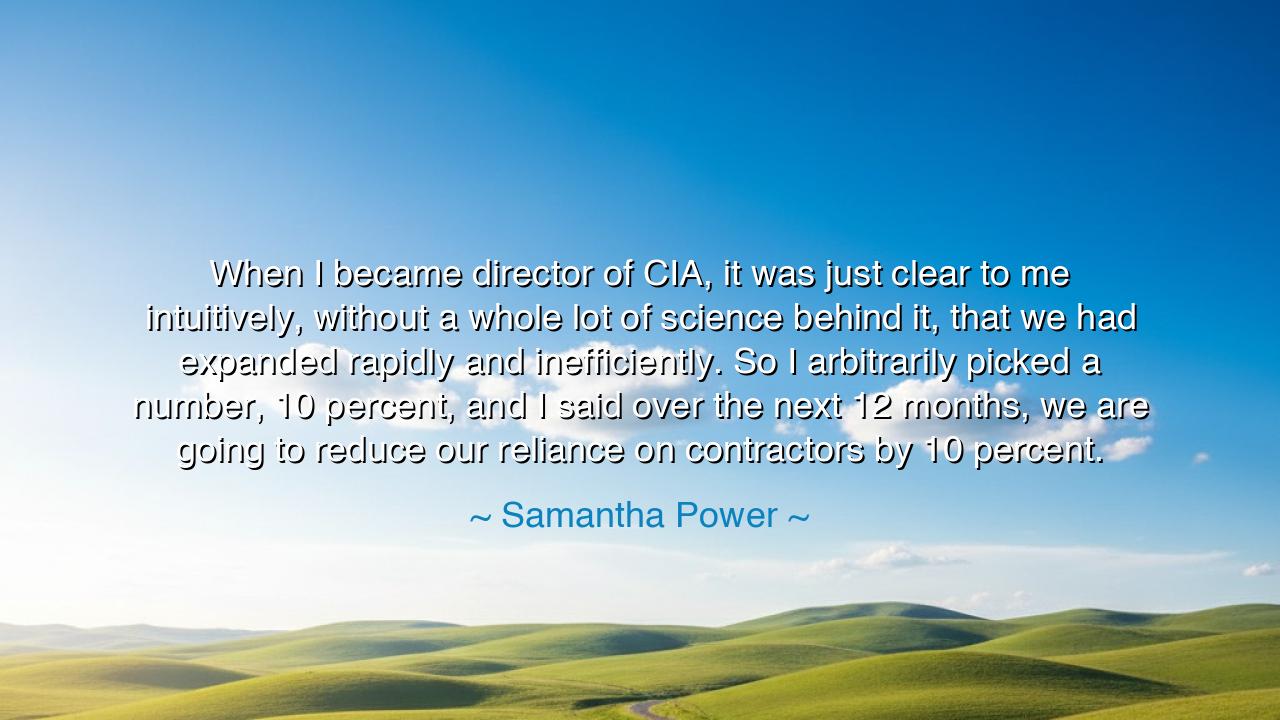
When I became director of CIA, it was just clear to me
When I became director of CIA, it was just clear to me intuitively, without a whole lot of science behind it, that we had expanded rapidly and inefficiently. So I arbitrarily picked a number, 10 percent, and I said over the next 12 months, we are going to reduce our reliance on contractors by 10 percent.






Hear now, O children of wisdom, the words of Samantha Power, whose insight into leadership and decision-making offers us a lesson in the power of instinct, introspection, and pragmatism. She said, "When I became director of the CIA, it was just clear to me intuitively, without a whole lot of science behind it, that we had expanded rapidly and inefficiently. So I arbitrarily picked a number, 10 percent, and I said over the next 12 months, we are going to reduce our reliance on contractors by 10 percent." These words speak not only of a decision made in the heat of responsibility, but of the inner wisdom that guides us, often beyond the limits of data and calculation. It is the clarity of purpose, a deep recognition that things are out of balance, that drives change—without the need for rigid formulas or endless analysis.
In the ancient world, the great leaders and philosophers often faced decisions with little more than their intuition and experience to guide them. King Solomon, known for his legendary wisdom, ruled with an understanding that was not solely based on the scientific or the rational, but on the deep understanding of human nature and the world around him. When confronted with difficult decisions, he trusted in his inner wisdom, and his judgments—such as his famous decision in the case of the two women who claimed to be the mother of a child—illustrated that sometimes the best solution is not derived from a rigid system, but from understanding the situation and responding with clarity of mind. Power’s decision to reduce the reliance on contractors is akin to this ancient wisdom—sometimes, in the face of complexity, a clear, intuitive choice can bring about the balance and order needed.
Consider the story of Julius Caesar, who, in his leadership of the Roman Empire, often made strategic decisions that were based not on detailed plans or reports but on his keen instincts and understanding of his people. When he crossed the Rubicon in 49 BCE, he did so with the knowledge that it would be a point of no return. It was a decision that didn’t require extensive calculations, for Caesar understood, as Power did, that leadership often requires boldness, clarity, and action—qualities that surpass the limitations of mere analysis. His leadership, shaped by instinct, changed the course of Roman history. So, too, does Power’s approach demonstrate that sometimes decisive leadership is born not from >bold choices to correct course.
In today’s world, where information is abundant and decisions are often weighed down by endless data and reports, Power’s words serve as a reminder that leadership is also about trusting one’s instincts. When she became the director of the CIA, she understood immediately that the agency had grown inefficiently, but rather than getting lost in the overwhelming details, she trusted her intuition and set a simple yet powerful goal—to reduce reliance on contractors by 10 percent. In doing so, she took a pragmatic approach, recognizing the need for balance, efficiency, and sustainability within the organization. The results of her decision, though not based on complex equations or extensive studies, served to restore a necessary equilibrium and course-correct the agency’s trajectory.
The lesson of Power’s decision is clear: sometimes, the answers to complex challenges lie not in overthinking or overanalyzing, but in the clarity that arises from simple, direct actions. The ancient stoics taught that we must align our decisions with purpose and virtue, trusting in the wisdom that arises from our understanding of the world. Marcus Aurelius, in his Meditations, often spoke of the importance of acting with integrity and purpose, free from the distractions of fear or doubt. Similarly, Power’s decision to reduce the CIA’s reliance on contractors was an act of leadership rooted in clarity of purpose—a simple, intuitive response to a problem that required immediate attention.
Now, O children of the future, let Power’s words guide you in moments of uncertainty and complexity. In your journey through life, you will often face decisions that demand not only reason but also the courage to trust your own instincts. Science, data, and analysis are powerful tools, but they are not the only tools in the arsenal of the wise. The wisdom of the ancients teaches us that sometimes, the most effective decisions come from aligning our inner clarity with bold action—trusting in our ability to navigate the challenges of life with a sense of purpose and balance.
Take these lessons to heart, O children, for in a world where complexities seem to multiply with every passing day, the ability to cut through the noise with clarity and decisiveness is a power that will serve you well. Like Socrates, whose questions illuminated the path to wisdom, and like Power, whose leadership restored balance to a complex organization, you must learn to trust in the wisdom that arises from within you. The true power of leadership lies not only in the details but in the ability to see the big picture and take bold, simple steps toward a more balanced future.






AAdministratorAdministrator
Welcome, honored guests. Please leave a comment, we will respond soon